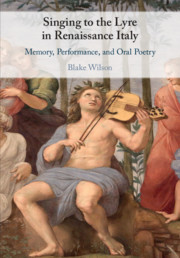Book contents
- Singing to the Lyre in Renaissance Italy
- Singing to the Lyre in Renaissance Italy
- Copyright page
- Contents
- Figures
- Tables
- Acknowledgments
- Abbreviations
- Introduction
- Part I The Canterino Tradition
- Part II Cantare ad Lyram: The Humanist Tradition
- 4 Florence: From Canterino to Cantare ad Lyram
- Excursus 2 Filippino Lippi’s Portrait of a Canterino
- 5 Cantare ad Lyram and Humanist Education
- 6 Cantare ad Lyram in the Courts
- 7 Rome: Cantare ad Lyram at the Summit
- Epilogue The Sixteenth Century
- Bibliography
- Index
5 - Cantare ad Lyram and Humanist Education
from Part II - Cantare ad Lyram: The Humanist Tradition
Published online by Cambridge University Press: 31 October 2019
- Singing to the Lyre in Renaissance Italy
- Singing to the Lyre in Renaissance Italy
- Copyright page
- Contents
- Figures
- Tables
- Acknowledgments
- Abbreviations
- Introduction
- Part I The Canterino Tradition
- Part II Cantare ad Lyram: The Humanist Tradition
- 4 Florence: From Canterino to Cantare ad Lyram
- Excursus 2 Filippino Lippi’s Portrait of a Canterino
- 5 Cantare ad Lyram and Humanist Education
- 6 Cantare ad Lyram in the Courts
- 7 Rome: Cantare ad Lyram at the Summit
- Epilogue The Sixteenth Century
- Bibliography
- Index
Summary
Besides Florence, the other formative context for the humanist cultivation of singing to the lyre were the educational environments in which the studia humanitatis was implemented. The primary sources are the humanist educational treatises written during the first half of the fifteenth century by figures like Pier Paolo Vergerio, Leonardo Bruni, and Battista Guarini. A careful re-reading of these sources reveals their attention to the aural qualities of written texts, especially poetry, and to the promotion of singing verse to the lyre as a way to develop proper diction, as an aid to the memorization of texts, and as a form of recreation with clear ancient precedent. The fundamentally oral aspect of humanist culture proceeds from its pedagogical and practical emphasis on rhetorical eloquence, and the view of cantare ad lyram as an integral aspect of rhetoric guaranteed for it a wide dissemination through the rapidly growing apparatus of humanist schools and universities. A final section devoted to the relatively unknown correspondence of Michele Verino, a student of the University of Florence with a predilection for singing to the lyre, complements the prescriptive approach of the educational treatises with the actual practices of a student enrolled in the studia humanitatis.
Keywords
- Type
- Chapter
- Information
- Singing to the Lyre in Renaissance ItalyMemory, Performance, and Oral Poetry, pp. 245 - 272Publisher: Cambridge University PressPrint publication year: 2019



